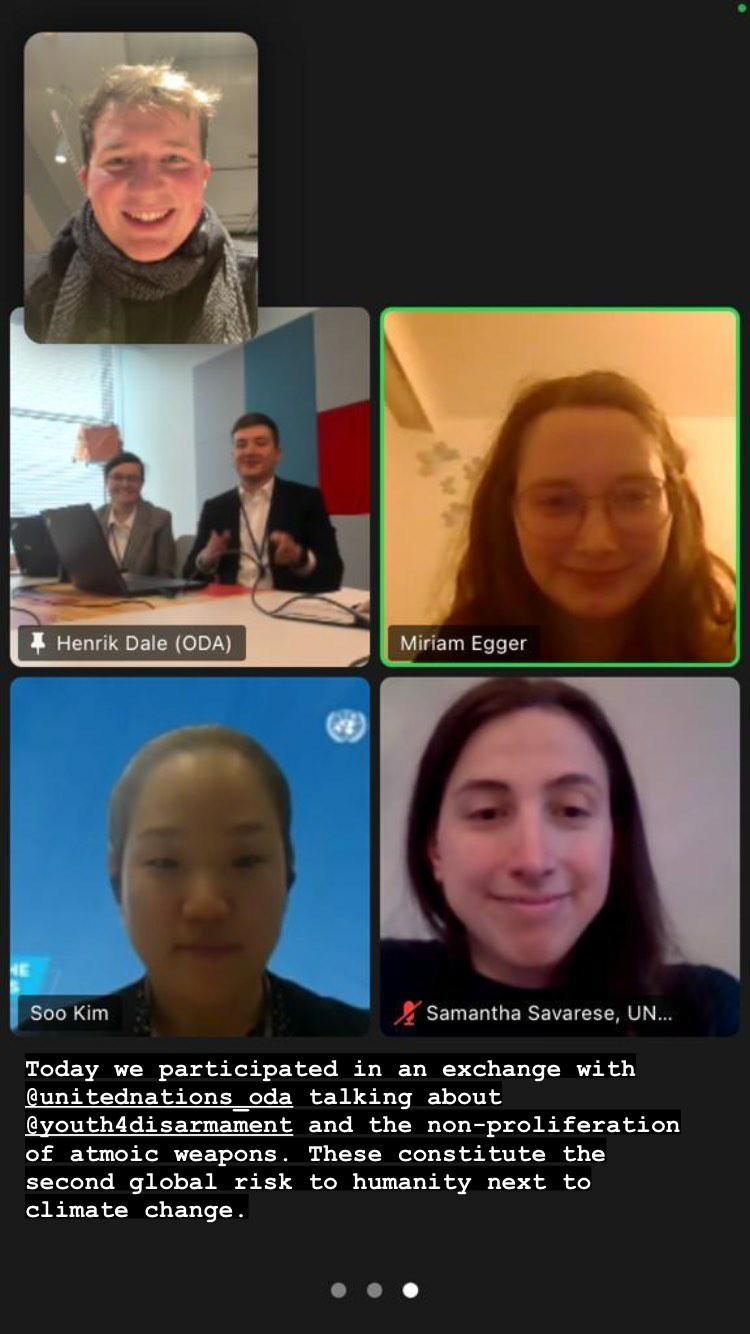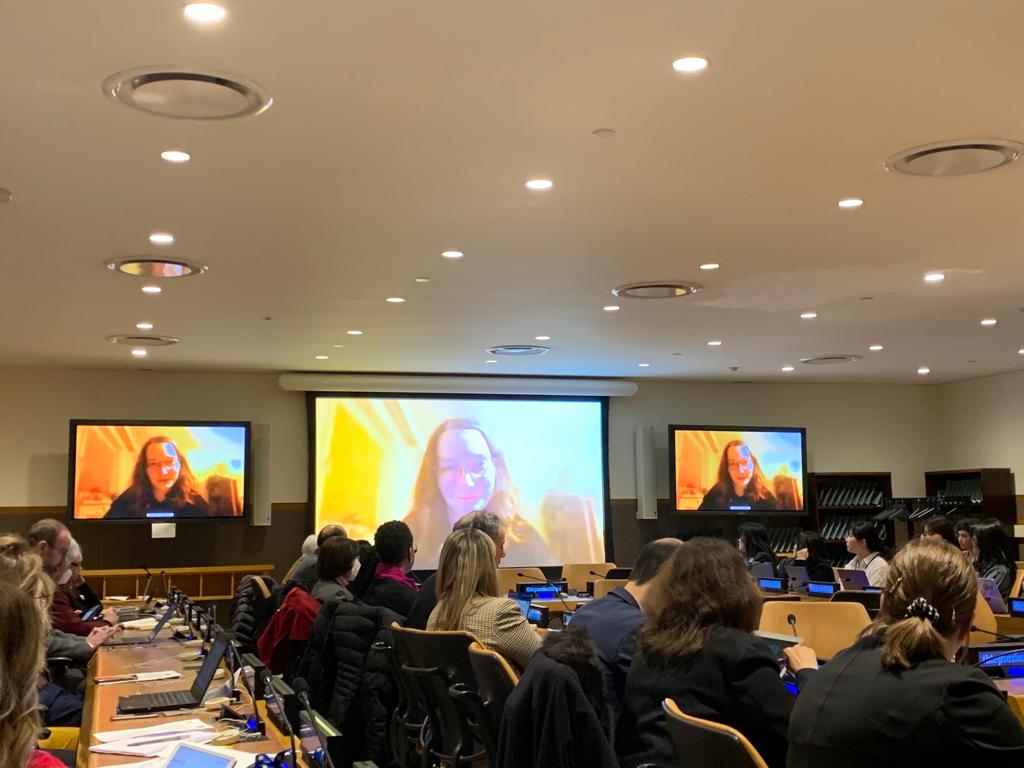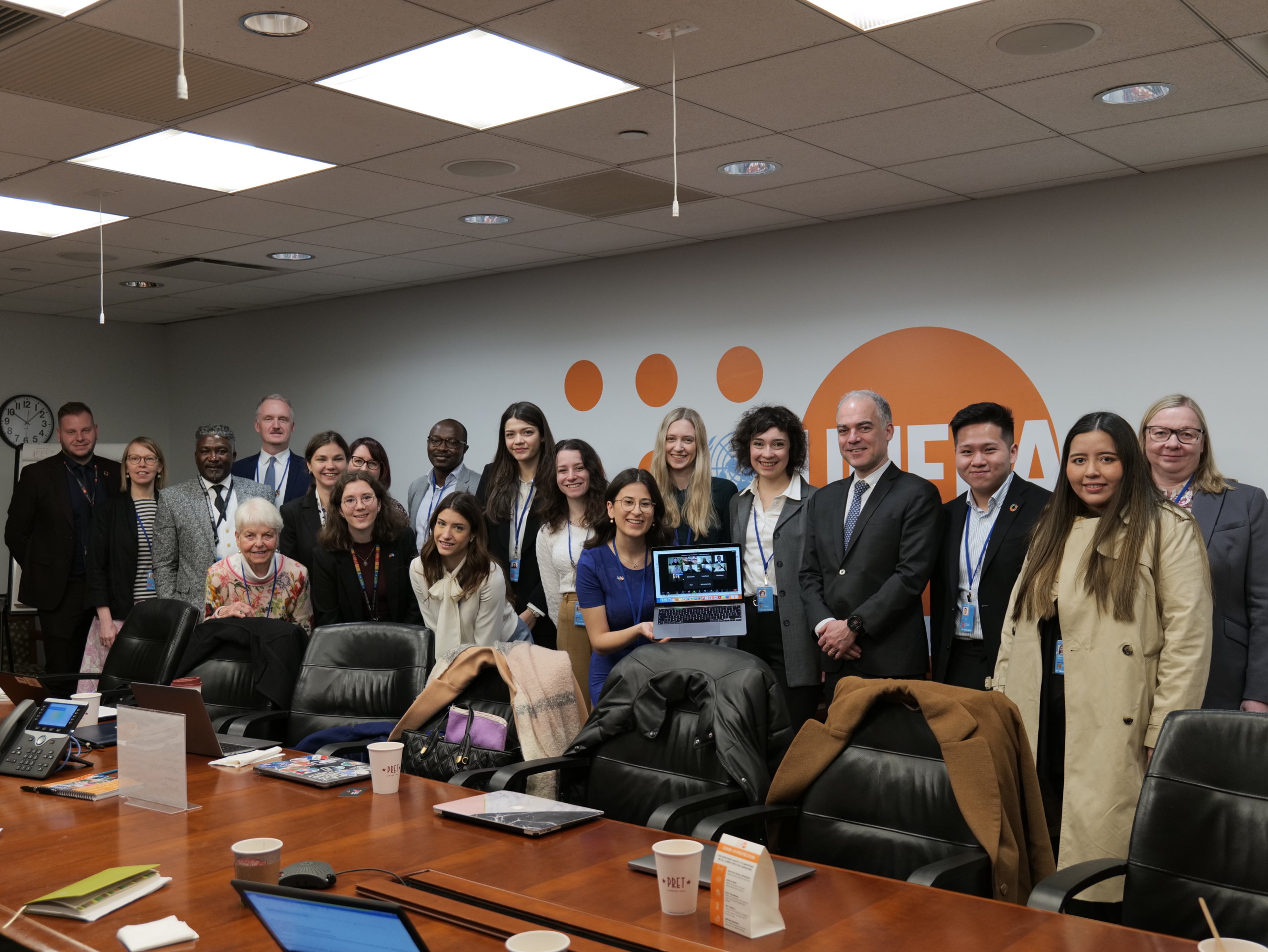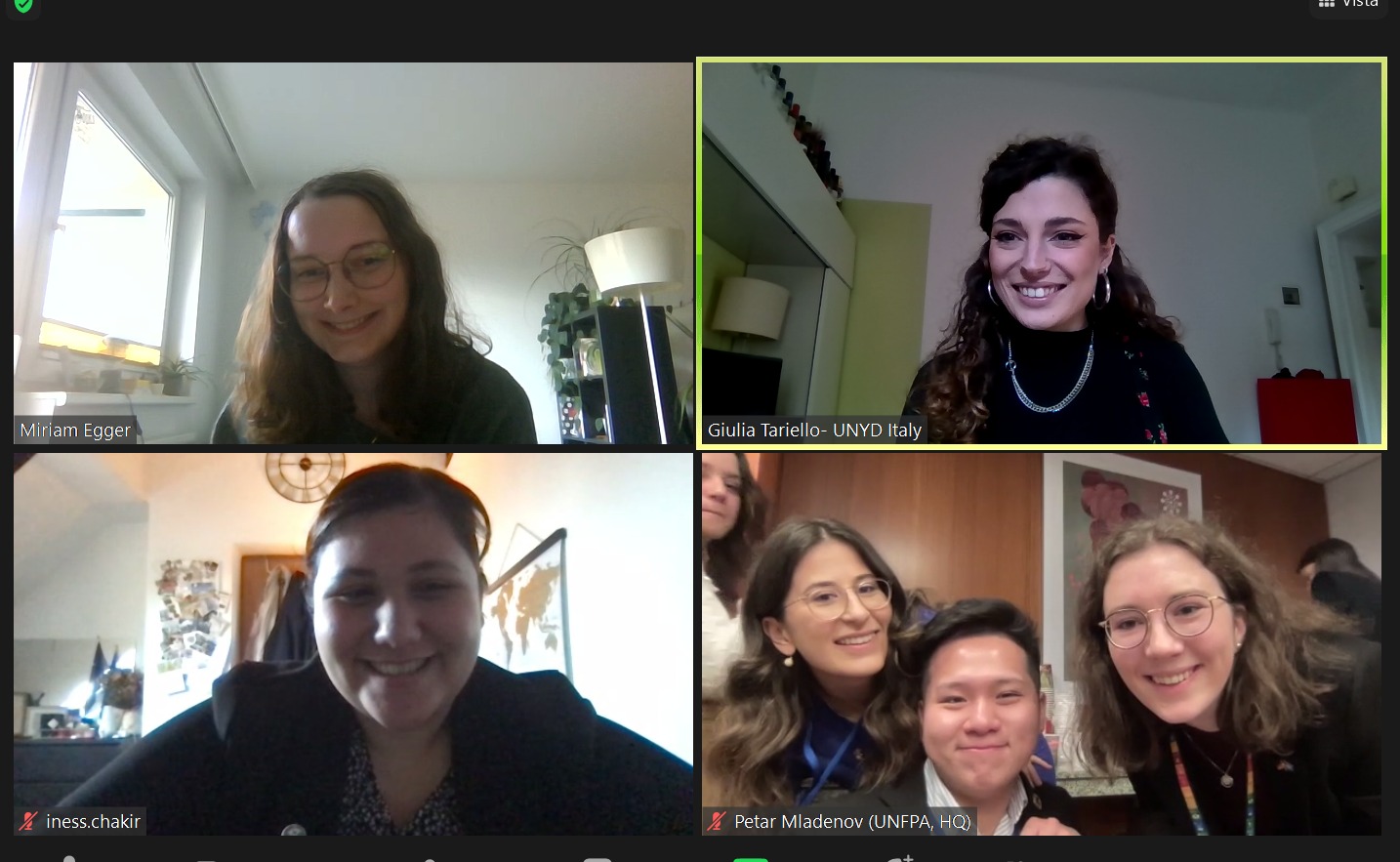Während UNYD Miriam Egger in New York für das ECOSOC Jugendforum ist machen wir einen Rückblick auf ein UN-Meeting an dem unsere beiden UNYDs Miriam und Marvin online teilgenommen und auch ein Side Event mit organisiert haben: Die 61. Commission for Social Development (CSocD)
Beitrag verfasst von Miriam Egger und Marvin Huber, Österreichische Jugenddelegierte zu den Vereinten Nationen
In der Einleitung der Charta der Vereinten Nationen (UN), was den Gründungsvertrag der UN darstellt, steht folgendes geschrieben:
„Wir, die Völker der Vereinten Nationen – fest entschlossen, den sozialen Fortschritt und einen besseren Lebensstandard in größerer Freiheit zu fördern, und für diesen Zweck internationale Einrichtungen in Anspruch zu nehmen, um den wirtschaftlichen und sozialen Fortschritt aller Völker zu fördern.“
Hört sich für dich abstrakt und etwas unverständlich an? Da kann ich durchaus zustimmen und darum schauen wir uns folgend gemeinsam ein Beispiel an, wie dieser Satz in der Praxis aussieht. Eine Konferenz, die sich mit dem Thema des sozialen Fortschritts beziehungsweise mit der sozialen Entwicklung auseinandersetzt, ist die CSocD. Das steht für Commission for Social Development oder auf Deutsch Kommission für soziale Entwicklung, wobei die 61. Sitzung im Februar in New York stattgefunden hat. Marvin und ich (Miriam) hatten die Möglichkeit uns auch virtuell einzubringen und damit zu erleben was unter dem Satz aus der UN Charta zu verstehen ist. Schauen wir es uns gemeinsam an!
Dieses Jahr hat sich die CSocD mit den SDGs 8 (Menschenwürdige Arbeit und Wirtschaftswachstum) und 10 (Weniger Ungleichheiten) auseinandergesetzt. Das Thema dabei war eine menschenwürdige Arbeit für alle Menschen zu gewährleisten und somit Ungleichheiten zu reduzieren. Ein großes Highlight für uns war es einen Beitrag zur Rede des österreichischen Botschafters leisten zu dürfen, wobei wir einen Fokus auf die Lehre und praktische Berufsbildung im Allgemeinen gelegt haben:
“The Austrian UN Youth Delegates believe that a society with meaningful employment as well as decent work for all people, especially the youth, can exist.
However, it is worrying that even before the COVID-19 pandemic, young people were three times more likely to be unemployed than adults. After two years of crisis, the situation even worsened existing inequalities for young people on the labour market. This is demonstrated by the fact that one in five young people between the age of 15 and 24 is not in education, employment or training.
To counteract this situation, policymakers need to implement effective vocational education for young people. In this regard, Austria’s apprenticeship system could serve as a best-practice example, because it equips young people with the right combination of in-school education and on-site work experience to be successful on the labour market. Following this example, the Austrian youth delegates see an urgent need to reduce the divide in labour market accessibility and to guarantee decent work for all. Therefore, they call on states to collaborate to create sustainable and inclusive workplaces, free of all forms of discrimination and to pay special attention to the vocational education of youth, sustainability in every profession and mental and physical welfare at the workplace.”
Zudem konnten wir uns während der Konferenz mit vielen UN Agencies austauschen und vernetzen. So zum Beispiel mit dem United Nations Office for Disarmament Affairs (UNODA) beziehungsweise dem Büro der Vereinten Nationen für Abrüstungsfragen. Zuletzt hatten wir die Möglichkeit an vielen Side Events teilzunehmen, welche von Mitgliedsstaaten und NGO’s rund um das Konferenzprogramm organisiert wurden. Speziell hat es uns dabei gefreut bei einem Side Event von Portugal und der Europäischen Union als Panelists zu den Potentialen eines intergenerationalen Dialogs zur Förderung von guter Arbeit reden zu dürfen. Oder um es mit den Worten meiner mexikanischen Jugenddelegiertenkollegin, Andressia Ramirez, zu sagen: „Each generation has something to learn from each other.“


Im Rahmen der CSocD haben Miriam und Marvin auch selbst ein Side Event organisiert:
Youth for Youth: Ensuring Quality Education and Gainful Employment within the Broader Framework of Sustainable Development
We had the pleasure of planning together with our fellow youth delegates from Switzerland, Finnland, Italy, Luxemburg and Germany a side event about “Youth for Youth: Ensuring Quality Education and Gainful Employment within the Broader Framework of Sustainable Development”. Side events are sm all events that are being organized by NGOs, UN member states or also by youth delegates. These events take place beside the official programme of the 61th Commission for Social Development and are a possibility to highlight a topic of significant importance.
all events that are being organized by NGOs, UN member states or also by youth delegates. These events take place beside the official programme of the 61th Commission for Social Development and are a possibility to highlight a topic of significant importance.
We and our fellow youth delegates are certain that there is a continuity between education and work needed and that we have in this regard to consider an intergenerational, international and long-term approach when preparing young people for the world of work. That’s why we – UN youth delegates – decided to broaden and deepen the discussion about quality education and gainful employment with our side event. Our priority objectives for the event were set to be to:
- Highlight the importance of the continuity between education and work, as well as underlining the need for an intergenerational, international and long-term approach when preparing young people for the world of work.
- Create awareness about the current issue of unemployment and major differences between employment tendencies for youth in the Global South and Global North.
- Provide UN Youth Delegates with the possibility to discuss and connect as well as network with representatives from different global organisations.


In the following we want to give to some insights from the discussion with our distinguished experts from the International Labor Organisation (ILO), UN Department of Economic and Social Affairs (UN DESA), UN Development Program (UNDP) and a representative of the Permanent Mission of Finland to the UN in New York.
Insights from our Expert
How to ensure access to decent jobs and what role do young people play in this regard?
 We need to put forward a social dialogue between workers, policy makers and youth to realise opportunities and meet challenges. At the state level makro economic policy need to be put forward which include labour market policies, employment strategies for youth, career guidance for the young, elaboration of employment service centers, better preparation for the labor market, community work programs etc.
We need to put forward a social dialogue between workers, policy makers and youth to realise opportunities and meet challenges. At the state level makro economic policy need to be put forward which include labour market policies, employment strategies for youth, career guidance for the young, elaboration of employment service centers, better preparation for the labor market, community work programs etc.
There is a need to introduce young people to the world of work at a young age given quality apprenticeships or payed internships to foster required skills especially in regard to technology, entrepreneurship, self-employment, rights at work and vocational training. These should especially focus on the green and digital economy as most jobs will be created there.
Is a transition to a sustainable future for youth possible without a huge divide between those who have yet to acquire basic rights such as digital access and those for whom digital is for example already a reality in education and work?
It is important to understand that inequalities evolve over generations and are nowadays often already inherited. Whilst Covid has globally disrupted educational trends, youth today are healthier and more prepared than the last generation and will definitely contribute to society greatly. However, today’s youth and the next generation will face inequality and economic insecurity this shows especially in the technological divide which needs urgent attention. Therefore, any policies aimed at increasing equal opportunity for youth are really important and should also focus on gender, ethnicity and equal opportunity around the world if we want to live in a sustainable world.
What challenges might arise in the process of preparing young people sustainably for the world of work, but also of adapting the labour market to the needs of young workers?
We finally must cut the circle of poverty, and focus educational efforts way outside the created bubbles. Free education, especially the abundance of intuition fees is key to enable equal access and opportunities in the labor market. Close attention needs, furthermore, to be paid to aspects of health, transition periods, employing people in vulnerable situations, youth and people with disabilities. Or with the words of our expert from the Finnish Mission “You don’t have to change the person but the workplace”.
How can we make sure that youth will be provided with the tools and the resources they need for their prosperity given the gap between the different regions?
This debate needs to take substantial global differences into account which nowadays include severe crisis such as war, the climate crisis, or the pandemic. However, in cooperation lies great potential to combat these crises. Scholarship programs from Europe, exchange of knowledge for teachers, pupils and students and generally free education merit the chance to overcome and bridge the gap. It is fundamental that both the private sector as well as public initiatives are used in these regards.
Open Discussion:
In the open part of the discussion every attendee had the opportunity to present their unique opinion. Natural, many interesting points were raised on the varying challenges in different countries, the question of need of disclosure of disabilities in the application process, potential new inclusive work selection criteria, social development programs, the role of young people of experts in their living reality, the necessity of leaving no one behind, the various forms of discrimination faces in the workplace, the need to increase the understanding of rights of workers, the position of labor unions, the need to close the digital divide, the generational differences in job preferences, the issue of unpaid internships and the role of self employment to circumvent workers law.
